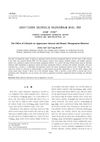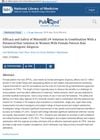 February 2024 in “Asian journal of medical sciences”
February 2024 in “Asian journal of medical sciences” Proper hygiene, adequate sleep, and self-care can reduce common skin diseases.
 86 citations,
May 2011 in “Journal of The American Academy of Dermatology”
86 citations,
May 2011 in “Journal of The American Academy of Dermatology” How bad a woman's hair loss is doesn't always match how it affects her happiness and daily life.
[object Object]  32 citations,
October 1999 in “Journal of women's health and gender-based medicine”
32 citations,
October 1999 in “Journal of women's health and gender-based medicine” Hair loss greatly affects women's mental health and appearance satisfaction.
 31 citations,
November 2000 in “Clinical and Experimental Dermatology”
31 citations,
November 2000 in “Clinical and Experimental Dermatology” WAA-QOL measures impact of hair loss on women's well-being.
 31 citations,
November 2000 in “Journal of the European Academy of Dermatology and Venereology”
31 citations,
November 2000 in “Journal of the European Academy of Dermatology and Venereology” Skin problems can be linked to sexual abuse, requiring careful medical and psychological evaluation.
 27 citations,
March 2013 in “Social Semiotics”
27 citations,
March 2013 in “Social Semiotics” Commercial hair loss websites promote Propecia by making men feel insecure about baldness and suggesting it's a medical issue needing treatment.
 4 citations,
September 2016 in “Journal der Deutschen Dermatologischen Gesellschaft”
4 citations,
September 2016 in “Journal der Deutschen Dermatologischen Gesellschaft” Some skin patients have body image issues linked to social difficulties but want psychological help.
 1 citations,
February 2017 in “Journal of Aesthetic Nursing”
1 citations,
February 2017 in “Journal of Aesthetic Nursing” Men are getting more beard transplants to look better and follow fashion trends.
 October 2023 in “Han'gug miyong haghoeji/Journal of the Korean society of cosmetology”
October 2023 in “Han'gug miyong haghoeji/Journal of the Korean society of cosmetology” Understanding psychological discomfort in hair loss can improve treatment outcomes.
 January 2009 in “Springer eBooks”
January 2009 in “Springer eBooks” The document concludes that treating skin conditions should include psychological care and a multidisciplinary approach is essential for effective management.
 December 2023 in “Journal of the Korean Society of Cosmetology”
December 2023 in “Journal of the Korean Society of Cosmetology” People interested in aesthetics, personality, and social life care more about their appearance and beauty routines.
 July 2012 in “Hair transplant forum international”
July 2012 in “Hair transplant forum international” Hair transplant improved self-perception in hair loss patients, but some still remained overly focused on their hair appearance.
January 2023 in “Odisha Journal of Psychiatry” Thorough patient interviews are crucial to identify self-inflicted hair loss.
January 2021 in “Menoufia Medical Journal (Print)” Androgenetic alopecia negatively affects emotions and self-confidence, especially in younger people.
16 citations,
February 2014 in “Iranian Red Crescent Medical Journal” Polycystic Ovary Syndrome (PCOS) affects Iranian women's feelings of femininity and self-image.
 2 citations,
April 2016 in “PubMed”
2 citations,
April 2016 in “PubMed” Using Minoxidil 2% solution with a botanical hair solution twice daily can significantly improve hair growth and quality in women with Female Pattern Hair Loss, boosting self-confidence and attractiveness.
 August 2012 in “Journal of Evidence-based Medicine”
August 2012 in “Journal of Evidence-based Medicine” Minoxidil helps with hair regrowth in women with androgenic alopecia.
 85 citations,
August 2018 in “Psychological Medicine”
85 citations,
August 2018 in “Psychological Medicine” Women with PCOS are more likely to suffer from depression, anxiety, and stress.

research Acne
58 citations,
January 1997 in “Dermatologic Clinics” Acne significantly affects mental health and quality of life, with research suggesting hormonal and genetic factors in its development and emphasizing early treatment to prevent scarring.
 26 citations,
March 2014 in “Arquivos Brasileiros De Endocrinologia E Metabologia”
26 citations,
March 2014 in “Arquivos Brasileiros De Endocrinologia E Metabologia” The document concludes that proper diagnosis and combined treatments are key for hirsutism management, and weight loss may help overweight patients.
 7 citations,
May 2013 in “Optometry and vision science”
7 citations,
May 2013 in “Optometry and vision science” Bimatoprost can help regrow eyelashes in people with trichotillomania.
 3 citations,
May 2010 in “Nursing Standard”
3 citations,
May 2010 in “Nursing Standard” Treatments for autoimmune hair loss have limited success and often relapse, and emotional support is crucial for those affected.
 August 2013 in “Pharmacy Today”
August 2013 in “Pharmacy Today” Viviscal may modestly improve hair loss in women without adverse effects.
 17 citations,
January 2007 in “Popular Communication”
17 citations,
January 2007 in “Popular Communication” Makeover TV shows promote unrealistic beauty standards and suggest women's worth is based on looks.
 16 citations,
June 2019 in “International Journal of Women's Dermatology”
16 citations,
June 2019 in “International Journal of Women's Dermatology” Type 2 diabetes may increase the risk of severe hair loss in African American women.
 15 citations,
September 2006 in “Journal of International Medical Research”
15 citations,
September 2006 in “Journal of International Medical Research” Nourkrin® significantly increased hair growth and was well-tolerated by people with hair loss.
 14 citations,
April 2020 in “Journal of Cosmetic Dermatology”
14 citations,
April 2020 in “Journal of Cosmetic Dermatology” QR678 treatments were more effective and comfortable for male hair loss than PRP treatments.
 1 citations,
September 2022 in “JMIR dermatology”
1 citations,
September 2022 in “JMIR dermatology” Alopecia Areata greatly affects the quality of life and mental health of Canadian patients and their caregivers.
 February 2024 in “Frontiers in physics”
February 2024 in “Frontiers in physics” The new model detects hair clusters more accurately and efficiently, helping with early hair loss treatment and diagnosis.
[object Object]  October 2023 in “The Open public health journal”
October 2023 in “The Open public health journal” Alopecia greatly affects Greek women's daily life, relationships, and self-image, with mixed social support and dissatisfaction with treatments.



























